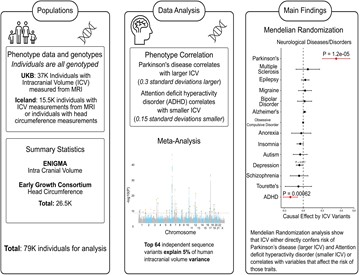Scientists at deCODE genetics, a subsidiary of Amgen, in collaboration with scientists at the National University Hospital of Iceland, have uncovered thirty novel sequence variants impacting human intracranial volume.
In the study, recently published, in the journal of Brain Communications, a genome-wide search for sequence variants affecting intracranial volume doubles the number of such variants identified and provides novel insights into the biology of brain structure. Twelve genes could be identified that likely mediate the effect of equally many variants, including GLI3 and CDK6 that affect cranial synostosis and microcephaly, respectively. Fifty-eight of the variants are associated with various traits, including personality/cognition/learning, cardiovascular disorders, and neurological and autoimmune disorders.
Intracranial volume correlates genetically with volumes of cortical and sub-cortical regions, cognition, learning and neurological traits. Parkinson’s disease cases have greater and Attention deficit hyperactivity disorder cases have smaller intracranial volume than controls.
Our Mendelian randomization studies indicate that alleles of variants that associate with increased intracranial volume increase the risk of Parkinson’s disease and decrease the risk of attention deficit hyperactivity disorder and neuroticism.
Previously, it has been shown that those with high education are more likely to develop Parkinson’s disease than those with little education. However, the study demonstrates that the effect of intracranial volume on Parkinson’s disease is stronger than that of educational attainment. Thus, it is possible that intracranial volume mediates the association between educational attainment and Parkinson’s disease.
